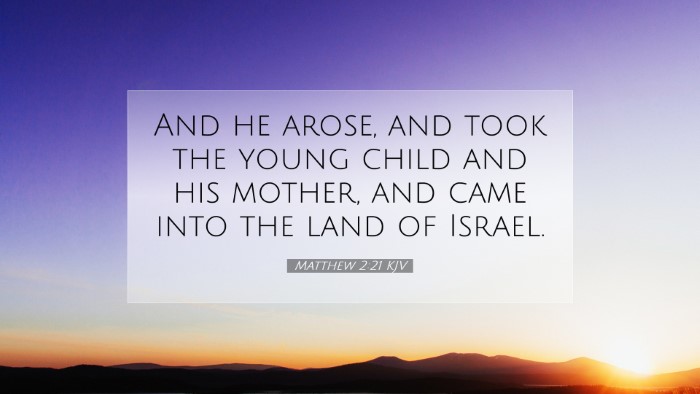Commentary on Matthew 2:21
Matthew 2:21 states, "And he arose, and took the young child and his mother, and came into the land of Israel." This verse marks a significant moment in the narrative surrounding the early life of Jesus, particularly His return to Israel after the threat posed by Herod had diminished. Below is a summary of insights drawn from various public domain commentaries.
1. Contextual Background
The events of this verse occur shortly after the extravagant gifts presented to Jesus by the Magi, followed by the perilous decree by King Herod to slaughter all male children in Bethlehem. After Joseph receives a warning from God through a dream, he escapes to Egypt, thus fulfilling the prophecy concerning the Messiah. Now, with Herod's death, the path is open for them to return home.
2. Matthew Henry’s Commentary
Matthew Henry emphasizes the providence of God in the movements of Joseph and Mary. He notes that the return to Israel was not merely geographical but loaded with significance. “It is a pleasing sight,” he writes, “to see the Son of God among His own people, fulfilling the purpose for which He was sent.” Henry also points out that Joseph’s obedience is commendable, as he arose immediately to the command, showcasing the virtue of prompt obedience to divine instruction.
Key Themes from Henry:
- Divine Guidance: Joseph’s decisions were guided by divine revelation, reaffirming the importance of heeding God’s directions.
- Fulfillment of Prophecy: This return is linked to prophetic traditions that speak of Jesus’ significance within Israel.
- Domestic Stability: By returning, Jesus is reestablishing His identity within His own familial context.
3. Albert Barnes’ Notes
Albert Barnes highlights that this verse illustrates the faithfulness of Joseph in following God’s commands. He points out the significance of the term “young child”, indicating Jesus’ early life and potential vulnerabilities. Barnes argues that this act of returning to Israel was also poignant as it represents not merely physical safety but the beginning of Jesus' public life and ministry within the community He came to save.
Insights from Barnes:
- Faith in Action: Joseph’s willingness to return to Israel reflects a profound trust in God’s plan, showcasing a model for believers.
- Symbolism of Place: Israel represents not only a homeland but a center for God’s salvific work, making it essential for Jesus’ ministry.
- Influence on Salvation History: This return sets the stage for Jesus’ eventual ministry, rooted in the traditions and history of the Jewish people.
4. Adam Clarke’s Commentary
Adam Clarke offers a critical view of the socio-political implications of this return. He notes that each moment of decision taken by Joseph had wider repercussions in the narrative of Israel’s redemption. Clarke emphasizes the prophetic dimension of their actions, suggesting that the return to Israel solidified Jesus' role as a fulfillment of Old Testament prophecies.
Reflections from Clarke:
- Historical Context: Clarke situates the verse in the broader historical narrative, emphasizing the perils and challenges faced by the Holy Family.
- Prophetic Continuity: The journey back to Israel is a reaffirmation of God's promises throughout Israel's history.
- Role of Parents: Joseph and Mary’s journey underlines the necessity of parental roles in fostering Jesus’ mission and identity.
5. Theological Implications
This verse encapsulates key theological implications for understanding Jesus' mission in relation to Israel and its people. Scholars identify the significance of fulfilling Old Testament prophecies through Jesus’ earthly journey. The act of returning showcases God’s sovereign plan working through human obedience and life circumstances.
Theological Reflections:
- Incarnation: The narrative further cements the doctrine of the Incarnation, illustrating God’s intimate involvement in human affairs.
- Covenantal Faithfulness: The event signifies the ongoing relationship between God and Israel, satisfying the covenant promises made throughout biblical history.
- Hope and Redemption: The journey back to Israel represents hope and redemption, characteristic of God's ultimate plan for humanity.
6. Practical Applications
For pastors and lay leaders, this verse emphasizes the importance of obedience to God’s direction, even when circumstances may appear daunting. It speaks to the faith required to act decisively when guided by divine revelation. In teaching settings, it can serve as an illustration of God’s providence and the essential nature of community in the faith journey.
Applications for Consideration:
- Encouragement in Obedience: Encourage individuals to recognize their personal call to action in their spiritual lives.
- Recognizing Divine Guidance: Teach about the necessity of discernment and responsiveness to God’s voice.
- Community and Identity: Emphasize the communal aspects of faith, linking individual faith journeys with the larger body of Christ.
Conclusion
Matthew 2:21 serves as a profound reflection on obedience, divine guidance, and the unfolding of God’s salvific plan through Jesus’ early life. It beckons believers to embrace the complex intersections of faith, history, and providence, urging them to consider their own responses to divine calling.


